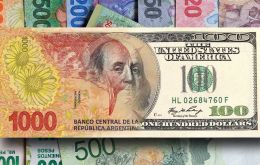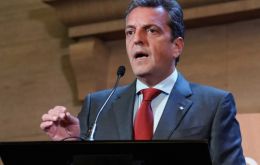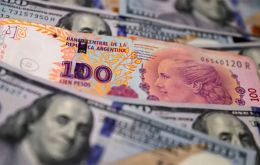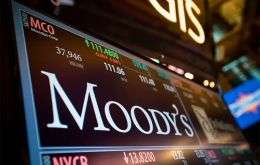MercoPress. South Atlantic News Agency
Economy
-
Wednesday, October 11th 2023 - 19:41 UTC
Economics Nobel to Claudia Goldin for women's participation in the global labor market

The Royal Swedish Academy of Sciences has decided to award the Sveriges Riksbank Prize in Economic Sciences in Memory of Alfred Nobel 2023 to Claudia Goldin, who has provided the first comprehensive account of women’s earnings and labor market participation through the centuries.
-
Wednesday, October 11th 2023 - 15:18 UTC
“Blue” dollar skyrockets past AR$ 1,000 threshold

The “blue” (a euphemism for the “black market” dollar) pierced the psychological AR$ 1,000 barrier Tuesday and closed the day at AR$ 1.010 after reaching AR$ 1.040 at some point, it was reported in Buenos Aires.
-
Tuesday, October 10th 2023 - 10:50 UTC
Argentina: “Blue” dollar hits AR$ 945 for hew all-time high

The “blue” (a euphemism for “black market”) dollar traded at AR$ 945 on Monday, thus reaching a new all-time high, it was reported in Buenos Aires as the Oct. 22 presidential elections loom over.
-
Monday, October 9th 2023 - 04:15 UTC
The Fintech Boom in Latin America

After COVID, the trendiest industry in emerging markets has likely been fintech. Financial services have a famously sluggish rate of development, but the pandemic sparked a remarkable digital acceleration that tipped institutions, small and medium-sized companies and even the government toward adopting fintech and making infrastructure investments.
-
Saturday, October 7th 2023 - 07:49 UTC
Argentina: Unstoppable “blue” dollar nears AR$ 900

The so-called “blue” (a euphemism for “black market”) dollar traded at AR$ 885 on Friday for a total increase of AR$539 so far this year and AR$ 42 overnight, it was reported in Buenos Aires. At some point Friday, it hit the psychological AR$ 900 landmark.
-
Saturday, October 7th 2023 - 07:32 UTC
Argentina/Brazil bilateral trade continues to fall, contracting 19,5% in September

Trade between Argentina and Brazil reached US$ 2.1 billion in September, marking a 19.5% decline compared to the US$ 2.66 billion recorded in the same month last year. This fact was brought to attention in a report by Argentina’s Chamber of Commerce and Services (CAC), which used official data from Brazil.
-
Saturday, October 7th 2023 - 07:27 UTC
WTO cuts 2023 global trade growth by half to 0,8%; forecasts a great 3,3% leap in 2024

The World Trade Organization (WTO) expects international trade to grow by 0.8% this year, down from the 1.7% estimated in April. In its updated forecasts released this week, the organization justifies the downgrade with an inflationary environment, rising interest rates in the United States and the European Union, as well as tension in the Chinese real estate market.
-
Friday, October 6th 2023 - 10:50 UTC
Argentina not to pay IMF maturities until after the elections

Argentina will pay maturities worth US$ 2.6 billion to the International Monetary Fund (IMF) after the Oct. 22 presidential elections, it was reported Thursday in Buenos Aires. However, US$ 1.28 billion was due Friday, another US$ 640 million on Oct. 12, while a third payment of US$ 673 million was scheduled for the last working day of the month.
-
Friday, October 6th 2023 - 10:36 UTC
The sky is the limit for the “blue” dollar in Argentina

As underground exchange parlors were raided Thursday, the “blue” (a euphemism for “black market”) dollar soared against the Argentine peso, it was reported in Buenos Aires.
-
Friday, October 6th 2023 - 10:13 UTC
Moody's foresees Argentina's future between bad and worse

Regardless of who becomes Argentina's next president as of Decf. 10, 2023, Moody's foresees inflation in the South American country next year will reach 350%. The rating agency's “baseline scenario” scenario also contemplates an economic contraction of 3.5% by 2023, followed by another 2.5% next year, with prices climbing up to 25% each month.
